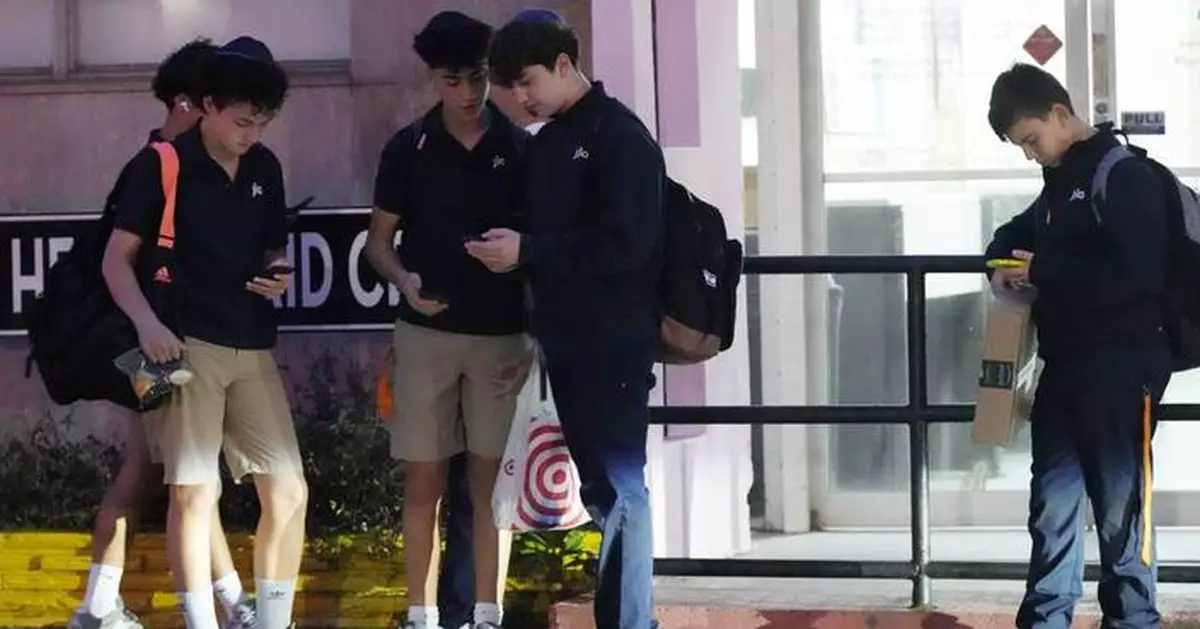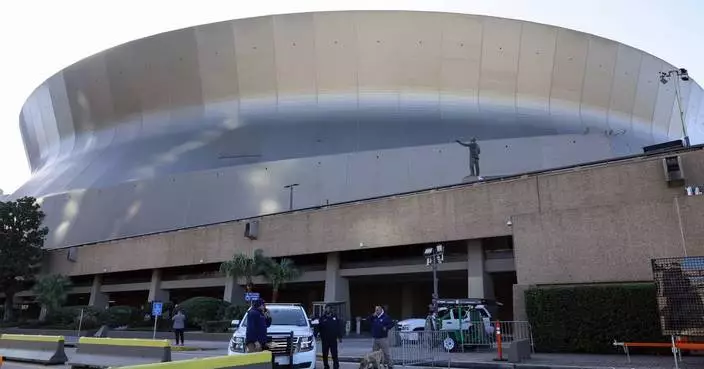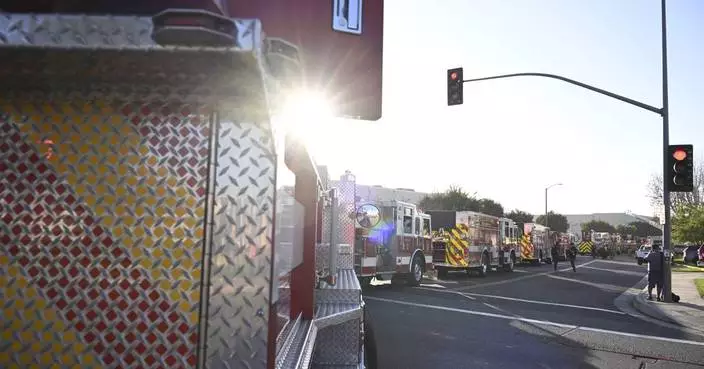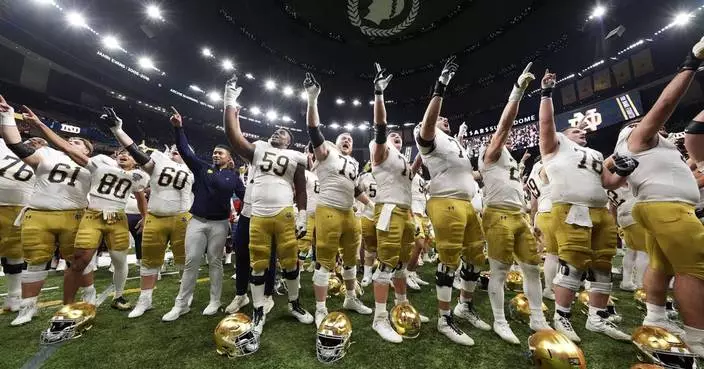TALLAHASSEE, Fla. (AP) — It’s no surprise that students are pushing back on cellphone bans in classrooms. But school administrators in one South Florida county working to pull students’ eyes away from their screens are facing some resistance from another group as well – parents.
Since the beginning of the 2024 school year in August, students in Broward County Public Schools, the country’s sixth largest district, have been barred from using cellphones during the school day, including during lunch and breaks, unless given special permission.
The schools are some of the many across the country wrestling with how to crack down on cellphones, at a time when experts say social media use among young people is nearly universal – and that screen time is linked to higher rates of anxiety and depression among kids.
But a survey sent out by the South Florida school district earlier this fall found that of the more than 70,000 students, teachers and parents surveyed, nearly one in five parents believe the cellphone ban is having a negative impact on their student’s wellbeing.
Among the top concerns for the students and parents surveyed is not being able to communicate with their family members, especially in an emergency — an anxiety that cuts deep in the district that’s home to Marjory Stoneman Douglas High School, where a 2018 shooting killed 17 people.
District officials have said students can use their phones during an emergency and that teachers have the flexibility to grant kids access for other reasons too.
“I don’t think any of us thinks kids should be on their phones during class,” said Erin Gohl, a parent and advocate in the district.
“We’re really talking about giving kids tools during those times when they need it,” she added, including letting students use their phones for “positive mental health purposes”.
Officials in the Fort Lauderdale-area district have acknowledged that implementation of the policy has been inconsistent. Some teachers have struggled to monitor students’ phone use, and are facing the reality that for some kids, phones can be a needed tool to access online lessons and turn in assignments, especially for those who don’t have a school-issued laptop. And parents have argued their students are better off with their phones, helping them coordinate afternoon pickup times or text their parents for advice about a school bully.
“I don’t expect students to say — or parents of high schoolers to say — right, that, they don’t want their kids to have cellphones,” said Howard Hepburn, Broward superintendent of schools. “The expectation that we’re going to just have a hard stop is not reality. It takes time.”
Landyn Spellberg, a student advisor to the Broward school board, said there are a lot of benefits to phones — and that the district's blanket ban isn't helping students with something many adults still struggle with: learning how to use technology in a healthy way.
“I think it’s important that we teach students about the negatives,” he said. “We don’t inform students of those things.”
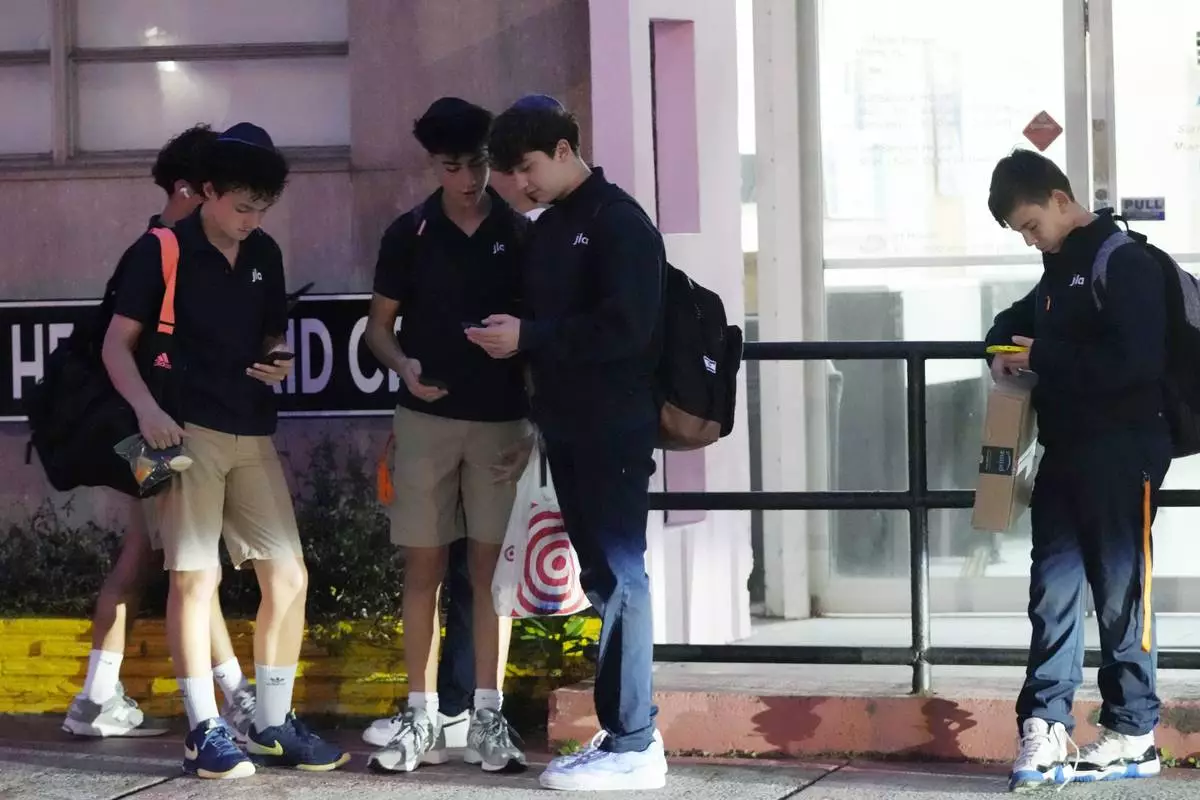
Students wait for their bus to school, Tuesday, Oct. 29, 2024, in Surfside, Fla. Daylight saving time ends at 2 a.m. local time Sunday, Nov. 3. Standard time will last until March 9. (AP Photo/Marta Lavandier)
SEOUL, South Korea (AP) — South Korean investigators attempted to detain impeached President Yoon Suk Yeol on Friday over his short-lived imposition of martial law, as hundreds of his supporters gathered outside his residence vowing to protect him.
It’s the latest confrontation in a political crisis that has paralyzed South Korean politics and seen two heads of state impeached in under a month. It began on Dec. 3 when Yoon, apparently frustrated that his policies were blocked by an opposition-dominated parliament, declared martial law and dispatched troops to surround the National Assembly.
Parliament overturned the declaration within hours in an unanimous vote and impeached Yoon himself on Dec. 14, while South Korean authorities opened a criminal investigation into the events. Yoon has remained defiant, ignoring requests for questioning and vowing to fight to remain in office.
Nearly three hours after dozens of investigators and police officers were seen entering the gate of the residence in Seoul to execute a warrant for Yoon’s detention, the dramatic scene appeared to have developed into a standoff.
The anti-corruption agency didn’t immediately reply to questions about whether investigators successfully entered Yoon’s residential building, but South Korea’s YTN television reported scuffles as investigators and police confronted the presidential security forces. South Korea’s Defense Ministry confirmed that the investigators and police officers got past a military unit guarding the residence’s grounds. The presidential security service, which controls the residence itself, refused to comment on whether its members were confronting investigators and whether they planned to block the detention attempt.
South Korea’s Yonhap news, citing anonymous police sources, reported that the presidential security service has informed investigators it will not allow them to enter the residence.
In a defiant New Year’s message to conservative supporters rallying outside his residence, Yoon said he will “fight to the end” against “anti-state forces.” His lawyers have described the warrant as “invalid” and “illegal,” and said that the presidential security force could arrest police trying to execute it.
Thousands of police officers gathered at Yoon’s residence and forming a perimeter around a growing group of pro-Yoon protesters, who braved subfreezing temperatures for hours, waving South Korean and American flags while chanting slogans in his support. There were no immediate reports of major clashes.
A Seoul court issued a warrant for Yoon’s detention on Tuesday after he evaded multiple requests to appear for questioning and blocked searches of his office in Seoul, hindering an investigation into whether his ill-conceived power grab on Dec. 3 amounted to rebellion.
The warrant is valid for one week, and investigators may make another attempt to detain Yoon if they are unable to do so on Friday.
Investigators from the anti-corruption agency were earlier seen loading boxes into several vehicles before leaving their building in the city of Gwacheon early in the morning. Television footage later showed some of those vehicles weaving between police buses that tightly packed and barricaded the streets near Yoon’s residence.
If Yoon is detained, the anti-corruption agency will have 48 hours to either request a warrant for his formal arrest or release him. Yoon’s defense minister, police chief and several top military commanders have already been arrested over their roles in the period of martial law.
Yoon Kap-keun, one of Yoon’s lawyers, described the investigators’ efforts to detain the president as illegal and said they would plan to pursue unspecified legal steps against the anti-corruption agency.
Yoon’s lawyers have argued the court’s detainment warrant is invalid, claiming that the anti-corruption agency lacks the legal authority to investigate rebellion charges. They also accuse the court of bypassing a law that says locations potentially linked to military secrets cannot be seized or searched without the consent of the person in charge.
The lawyers have said police officers would be exceeding their legal authority if they assist in detaining Yoon, and could face arrest by either the “presidential security service or any citizens.” They didn’t elaborate further on the claim.
Critics accused Yoon of inciting his supporters to obstruct attempts to detain him. South Korean law permits anyone to make an arrest to stop an active crime.
The liberal opposition Democratic Party, which drove the legislative vote that impeached Yoon Suk Yeol on Dec. 14 over his imposition of martial law, accused the president of trying to mobilize his supporters to block his detention and called for law enforcement authorities to execute the warrant immediately.
Yoon Kap-keun, the president’s lawyer, filed a challenge with the Seoul Western District Court on Thursday to block both the detention warrant for Yoon Suk Yeol and a related search warrant for his residence. The lawyer argued that both warrants violate criminal laws and the constitution.
Yoon’s presidential powers were suspended following a National Assembly vote to impeach him on Dec. 14 over his imposition of martial law, which lasted only hours but has triggered weeks of political turmoil, halted high-level diplomacy and rattled financial markets. Yoon’s fate now lies with the Constitutional Court, which has begun deliberations on whether to uphold the impeachment and formally remove Yoon from office or reinstate him.
To formally end Yoon’s presidency, at least six justices on the nine-member Constitutional Court must vote in favor.
The National Assembly voted last week to also impeach Prime Minister Han Duck-soo, who became acting president after Yoon’s powers were suspended, over his reluctance to fill three Constitutional Court vacancies ahead of the court’s review of Yoon’s case.
Facing growing pressure, the new acting president, Deputy Prime Minister Choi Sang-mok, appointed two new justices on Tuesday, which could increase the chances of the court upholding Yoon’s impeachment.
Yoon’s imposition of martial law ended after only six hours when the National Assembly voted 190-0 to lift it despite attempts by heavily armed soldiers to prevent them from voting.
Yoon has defended his martial law decree as a necessary act of governance, portraying it as a temporary warning against the Democratic Party, which he has described as an “anti-state” force obstructing his agenda with its legislative majority.
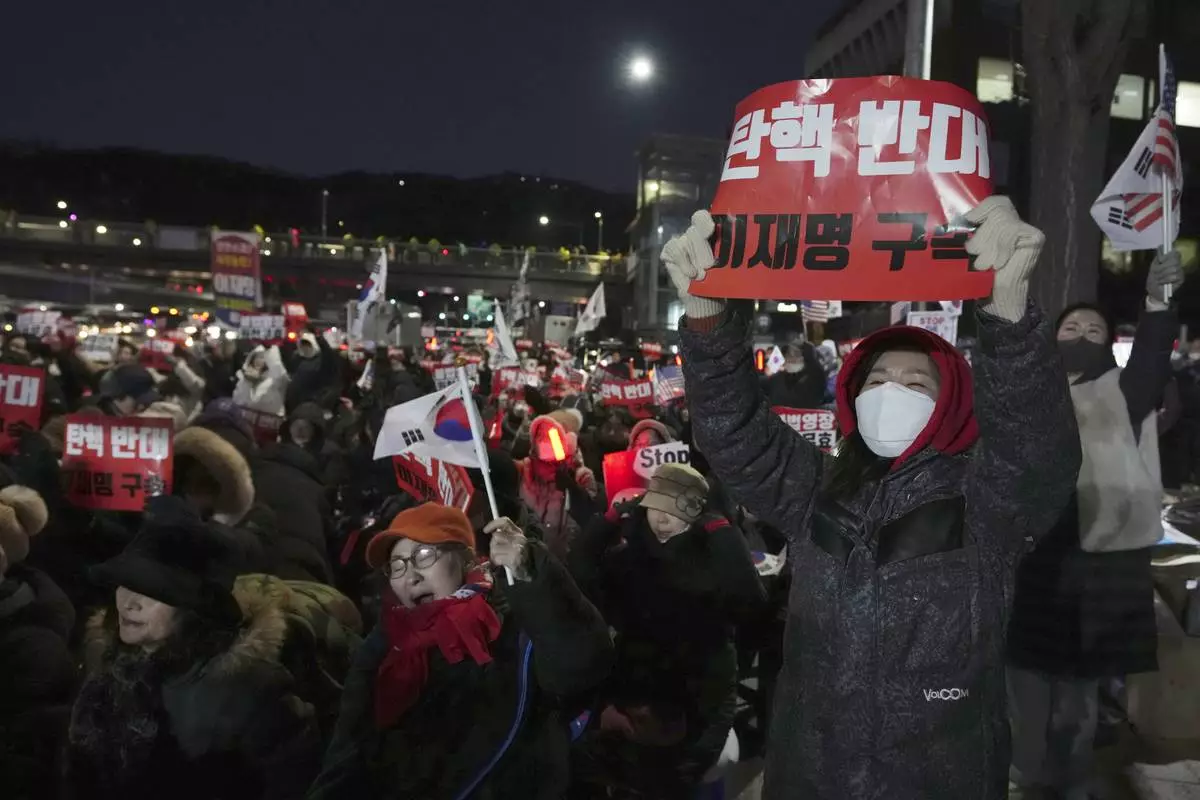
Supporters of impeached South Korean President Yoon Suk Yeol stage a rally to oppose a court having issued a warrant to detain Yoon, as police offices stand guard near the presidential residence in Seoul, South Korea, Friday, Jan. 3, 2025. The sign reads "Oppose Impeachment." (AP Photo/Lee Jin-man)
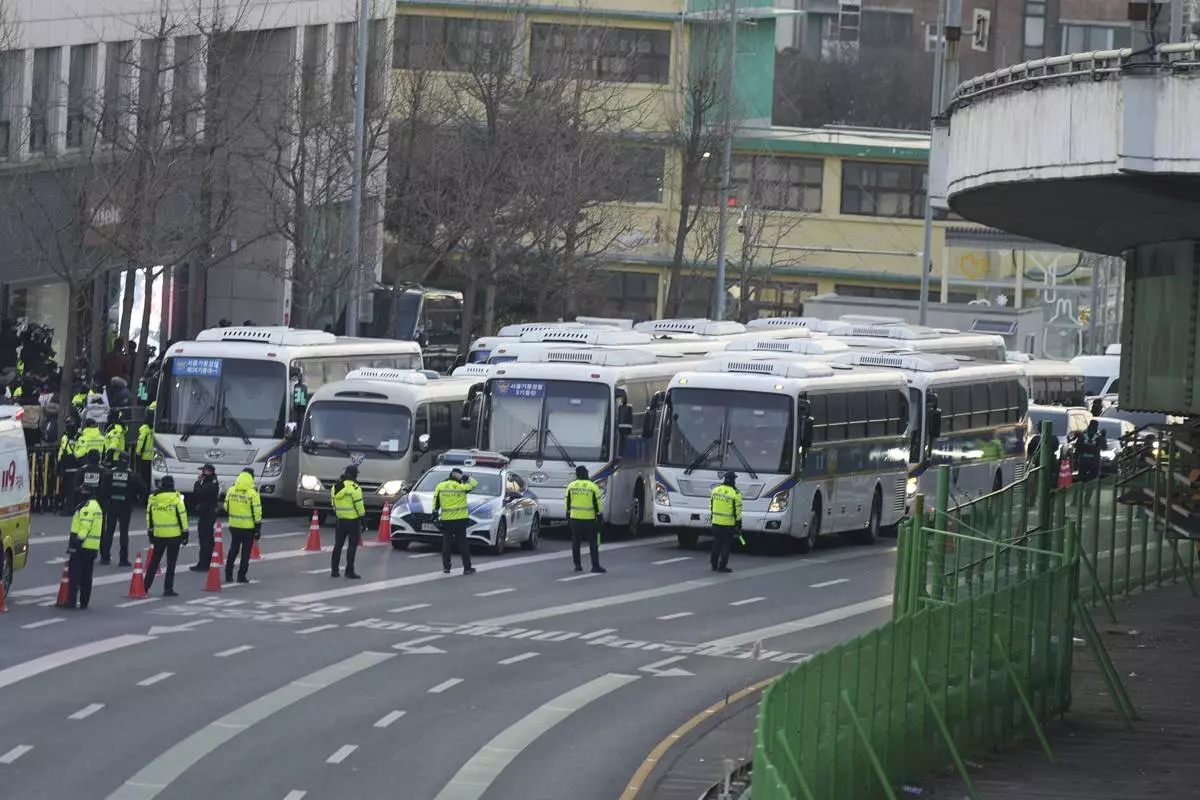
Police vehicles are seen near the gate of the presidential residence as supporters of impeached South Korean President Yoon Suk Yeol stage a rally to oppose a court having issued a warrant to detain Yoon, in Seoul, South Korea, Friday, Jan. 3, 2025. (AP Photo/Lee Jin-man)
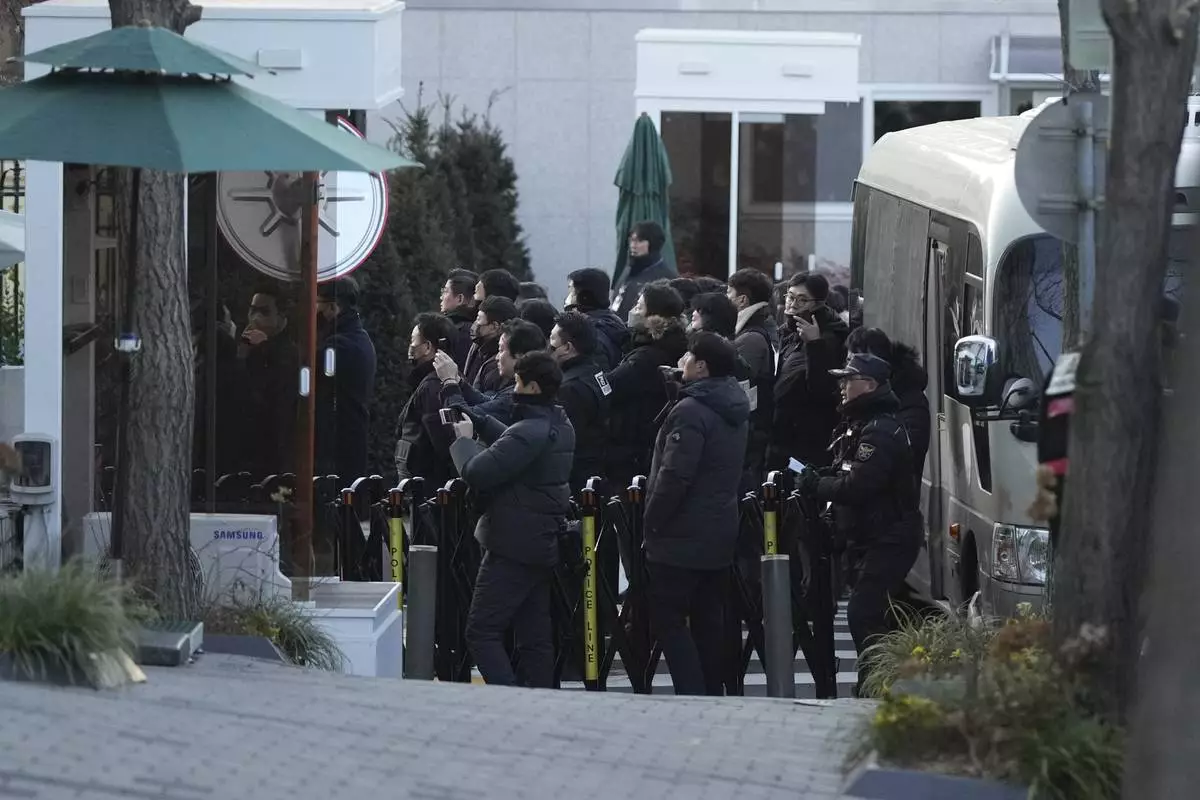
Police officers arrive at the gate of the presidential residence as supporters of impeached South Korean President Yoon Suk Yeol stage a rally to oppose a court having issued a warrant to detain Yoon, in Seoul, South Korea, Friday, Jan. 3, 2025. (AP Photo/Lee Jin-man)
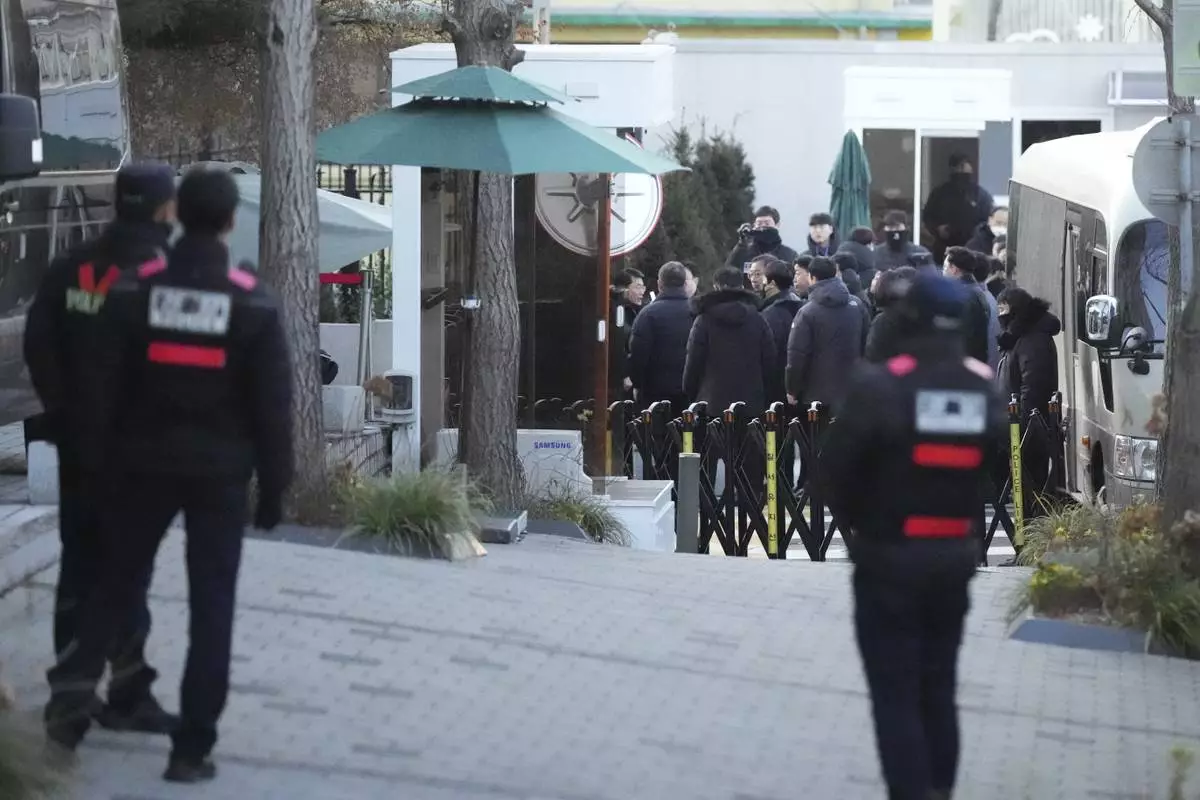
Investigators from the Corruption Investigation Office for High-ranking Officials arrive at the gate of the presidential residence as supporters of impeached South Korean President Yoon Suk Yeol stage a rally to oppose a court having issued a warrant to detain Yoon, in Seoul, South Korea, Friday, Jan. 3, 2025. (AP Photo/Lee Jin-man)
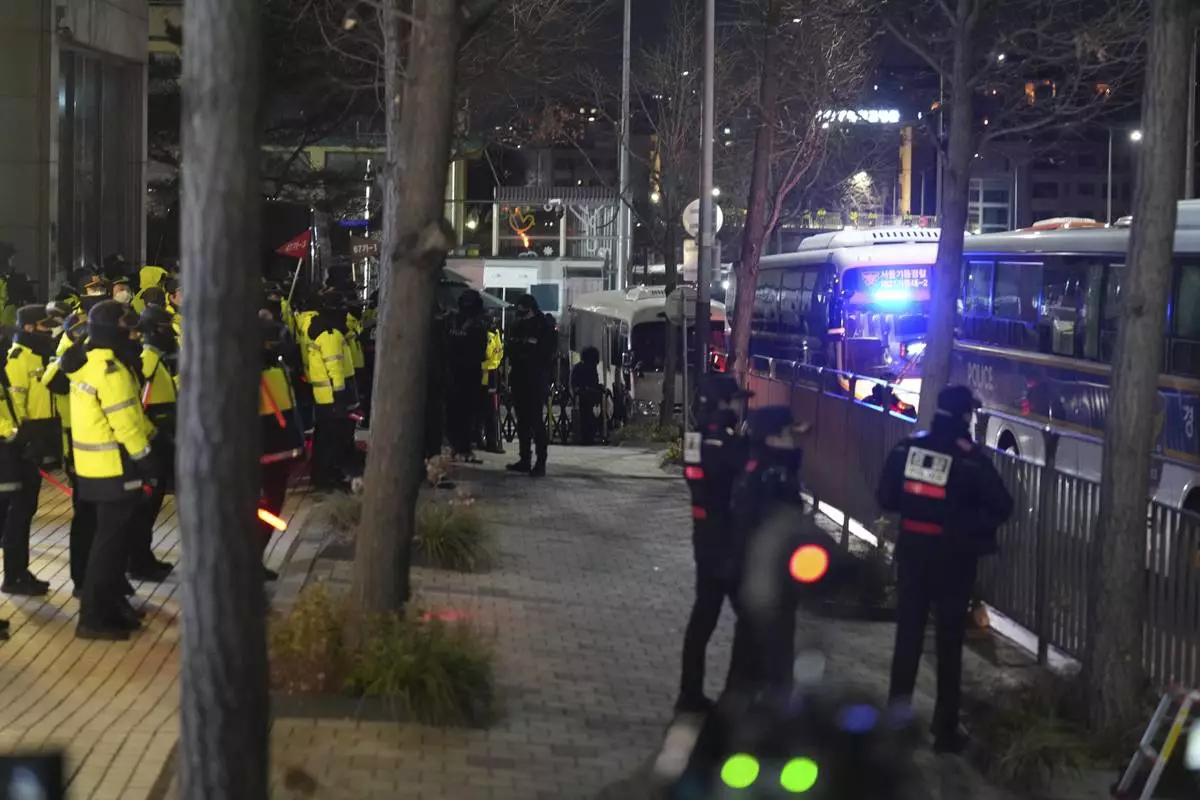
Police and barricades are placed in front of the gate of the presidential residence as supporters of impeached South Korean President Yoon Suk Yeol stage a rally to oppose a court having issued a warrant to detain Yoon, in Seoul, South Korea, Friday, Jan. 3, 2025. (AP Photo/Lee Jin-man)
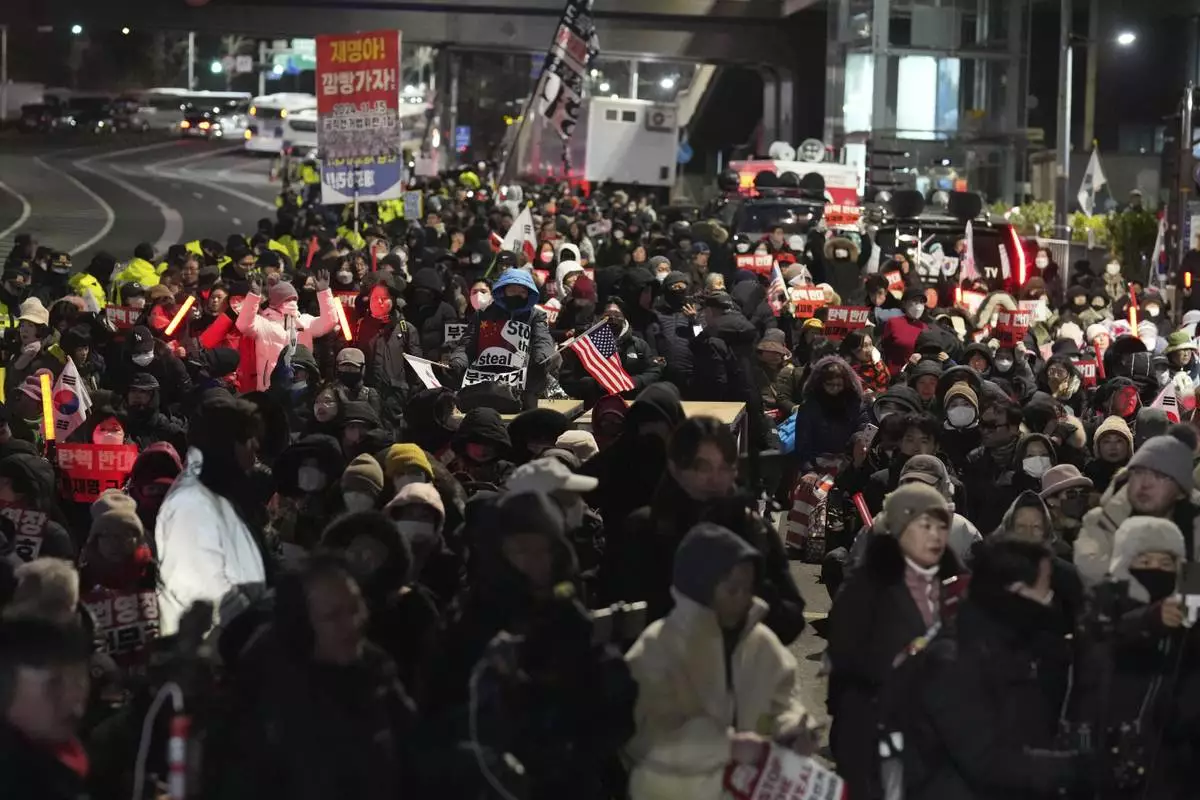
Supporters of impeached South Korean President Yoon Suk Yeol stage a rally to oppose a court having issued a warrant to detain Yoon, as police offices stand guard near the presidential residence in Seoul, South Korea, Friday, Jan. 3, 2025. (AP Photo/Lee Jin-man)
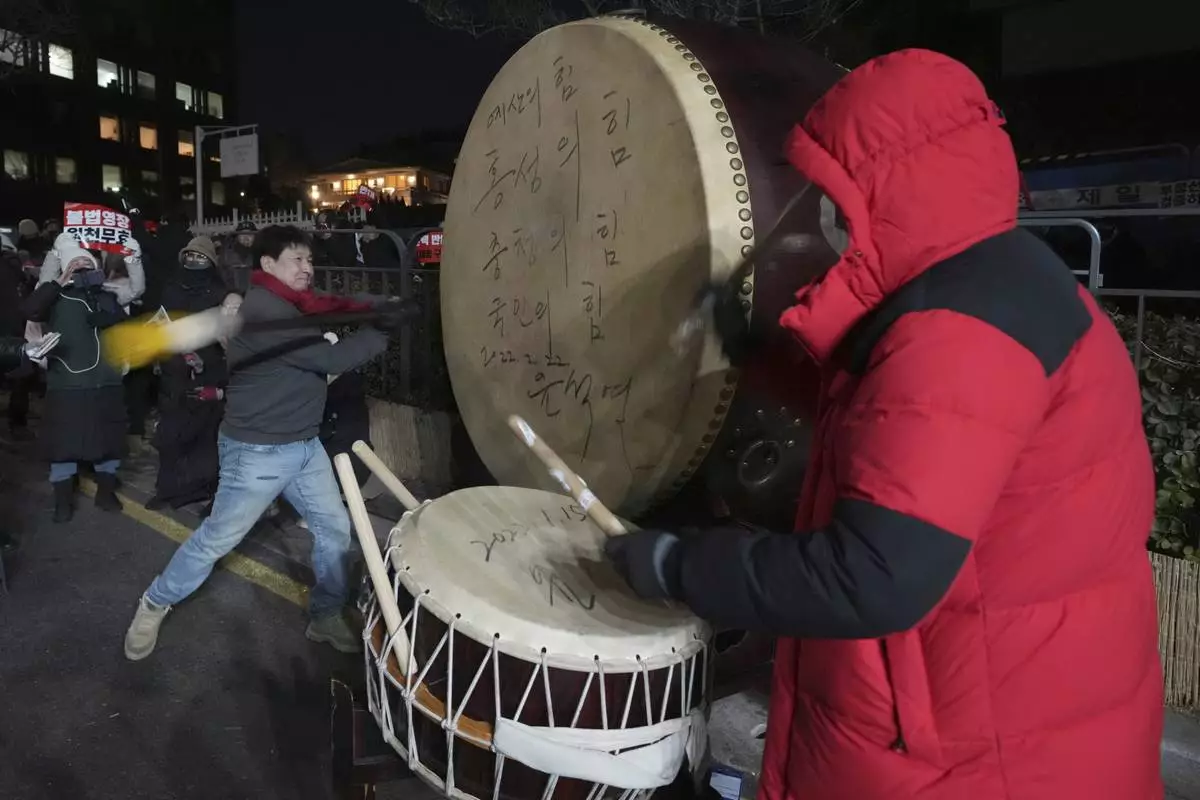
Supporters of impeached South Korean President Yoon Suk Yeol stage a rally to oppose a court having issued a warrant to detain Yoon, as police offices stand guard near the presidential residence in Seoul, South Korea, Friday, Jan. 3, 2025. (AP Photo/Lee Jin-man)
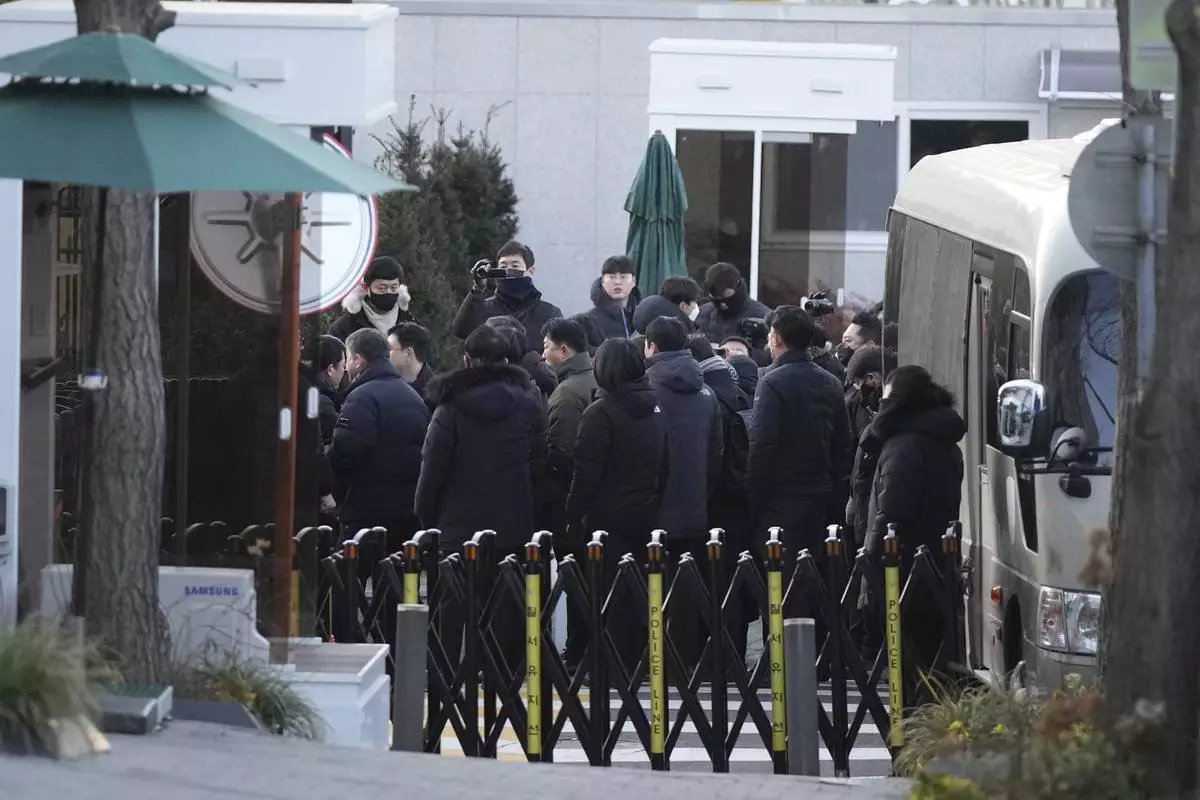
Investigators from the Corruption Investigation Office for High-ranking Officials arrive at the gate of the presidential residence as supporters of impeached South Korean President Yoon Suk Yeol stage a rally to oppose a court having issued a warrant to detain Yoon, in Seoul, South Korea, Friday, Jan. 3, 2025. (AP Photo/Lee Jin-man)
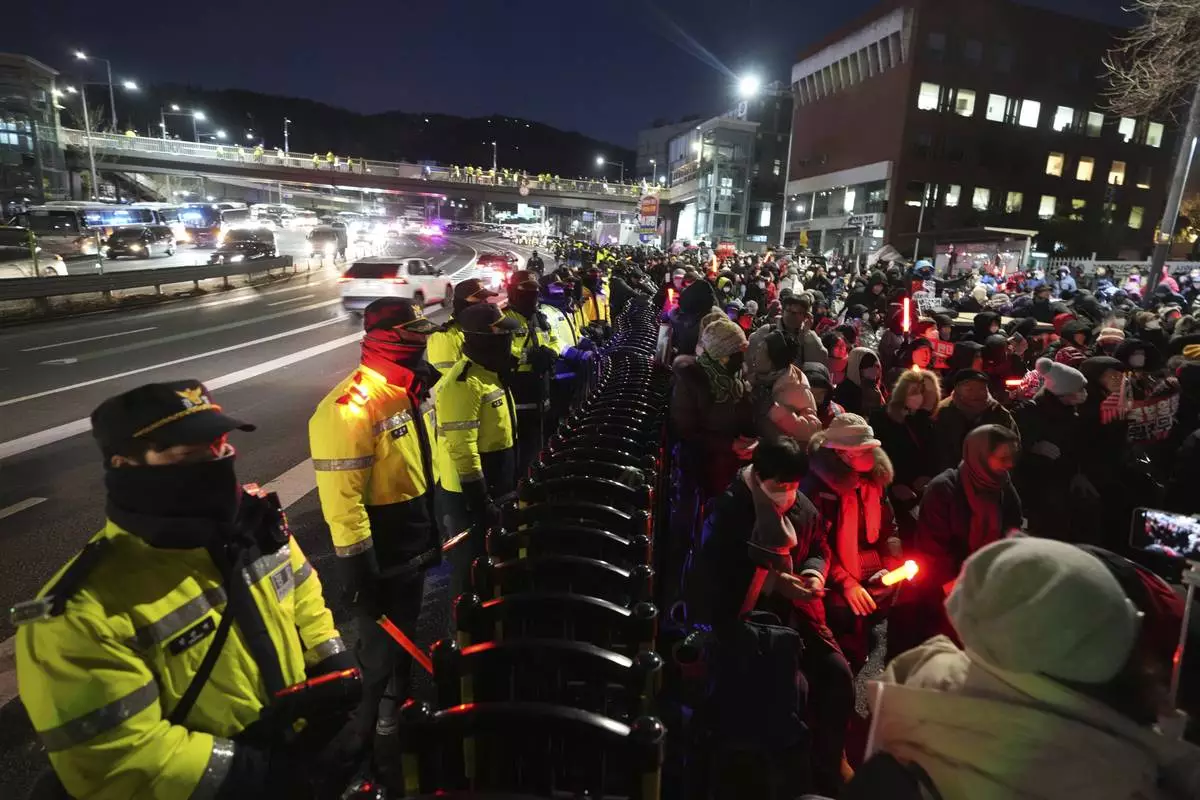
Supporters of impeached South Korean President Yoon Suk Yeol stage a rally to oppose a court having issued a warrant to detain Yoon, as police offices stand guard near the presidential residence in Seoul, South Korea, Friday, Jan. 3, 2025. (AP Photo/Lee Jin-man)
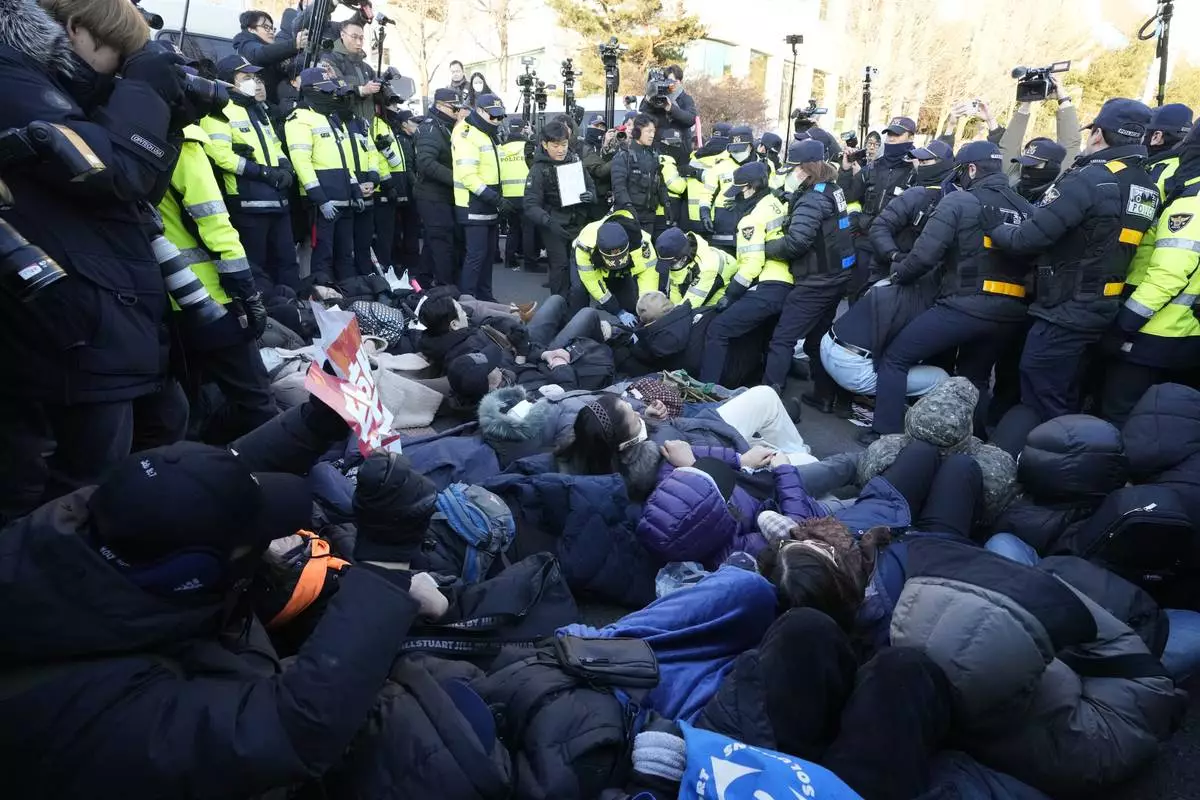
Police officers drag away supporters of impeached South Korean President Yoon Suk Yeol as Yoon faces potential arrest after a court on Tuesday approved a warrant for his arrest, near the presidential residence in Seoul, South Korea, Thursday, Jan. 2, 2025. (AP Photo/Ahn Young-joon)
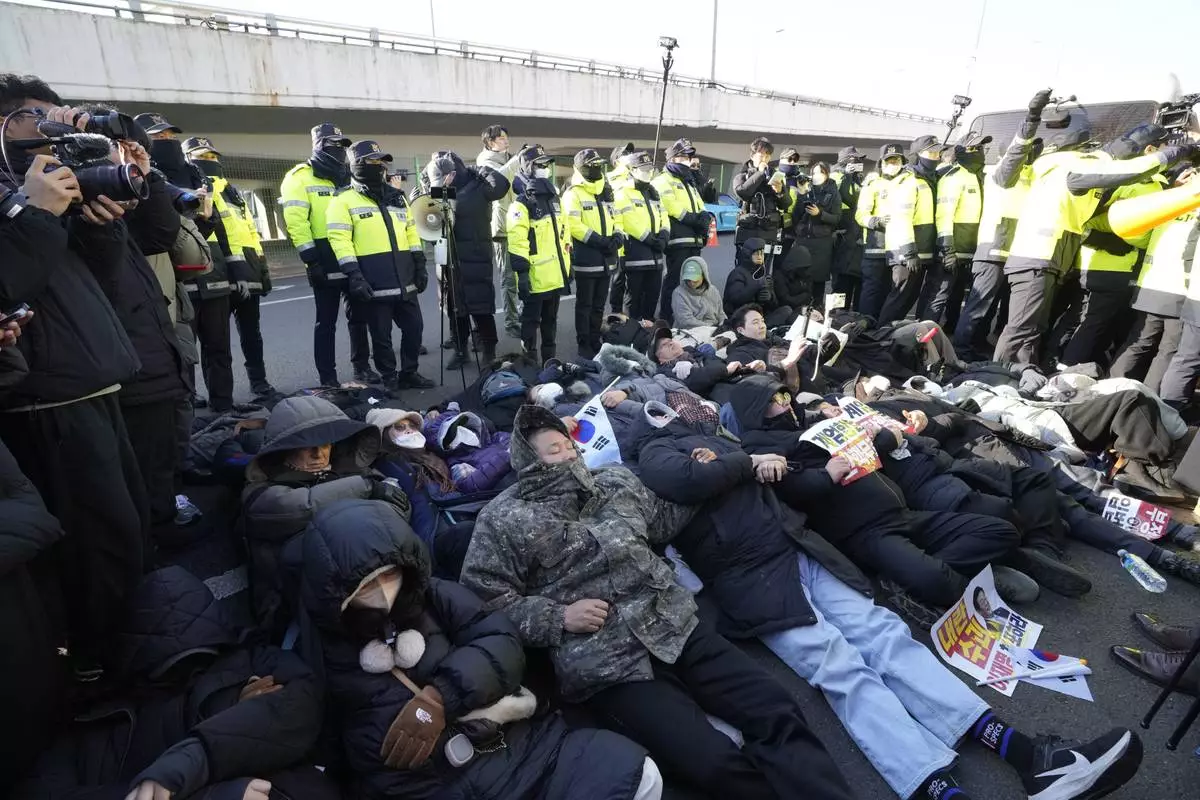
Supporters of impeached South Korean President Yoon Suk Yeol lie down on the ground as Yoon faces potential arrest after a court on Tuesday approved a warrant for his arrest, near the presidential residence in Seoul, South Korea, Thursday, Jan. 2, 2025. (AP Photo/Ahn Young-joon)
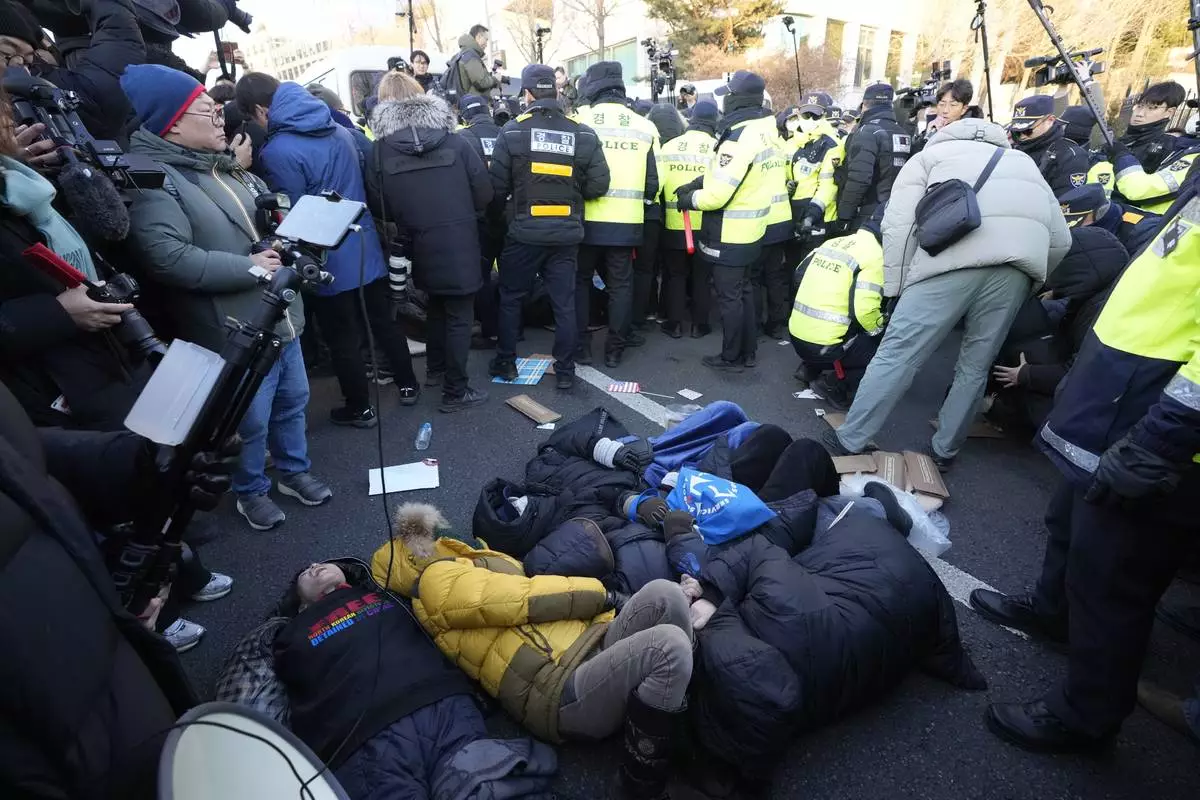
Supporters of impeached South Korean President Yoon Suk Yeol lie down on the ground as Yoon faces potential arrest after a court on Tuesday approved a warrant for his arrest, near the presidential residence in Seoul, South Korea, Thursday, Jan. 2, 2025. (AP Photo/Ahn Young-joon)
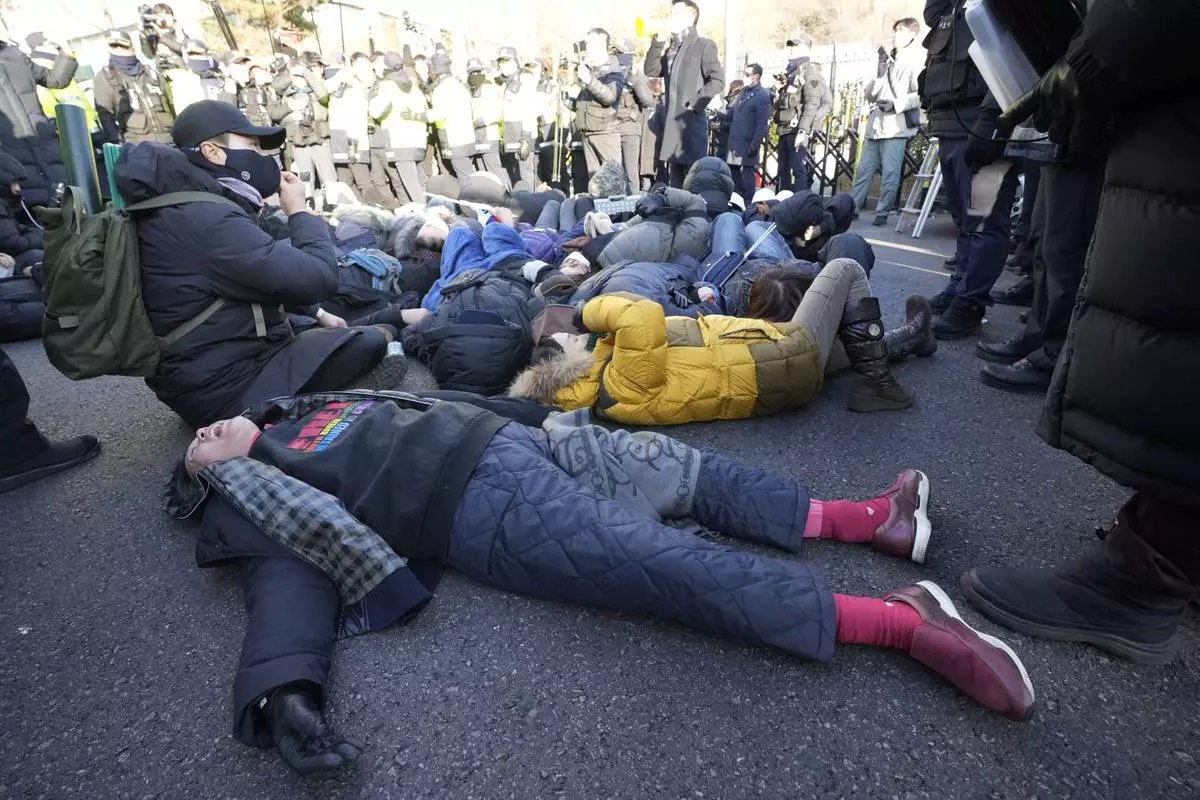
Supporters of impeached South Korean President Yoon Suk Yeol lie down on the ground as Yoon faces potential arrest after a court on Tuesday approved a warrant for his arrest, near the presidential residence in Seoul, South Korea, Thursday, Jan. 2, 2025. (AP Photo/Ahn Young-joon)
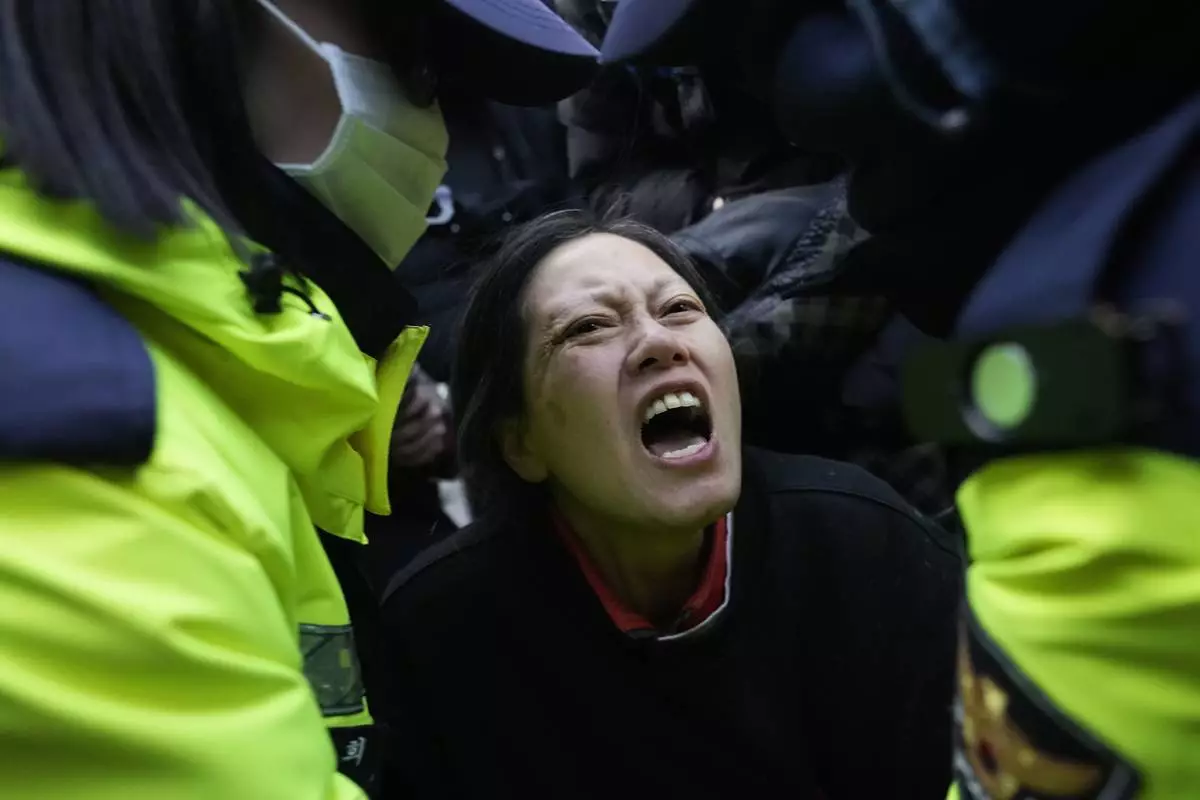
Police officers escort away a supporter of impeached South Korean President Yoon Suk Yeol as Yoon faces potential arrest after a court on Tuesday approved a warrant for his arrest, near the presidential residence in Seoul, South Korea, Thursday, Jan. 2, 2025. (AP Photo/Ahn Young-joon)
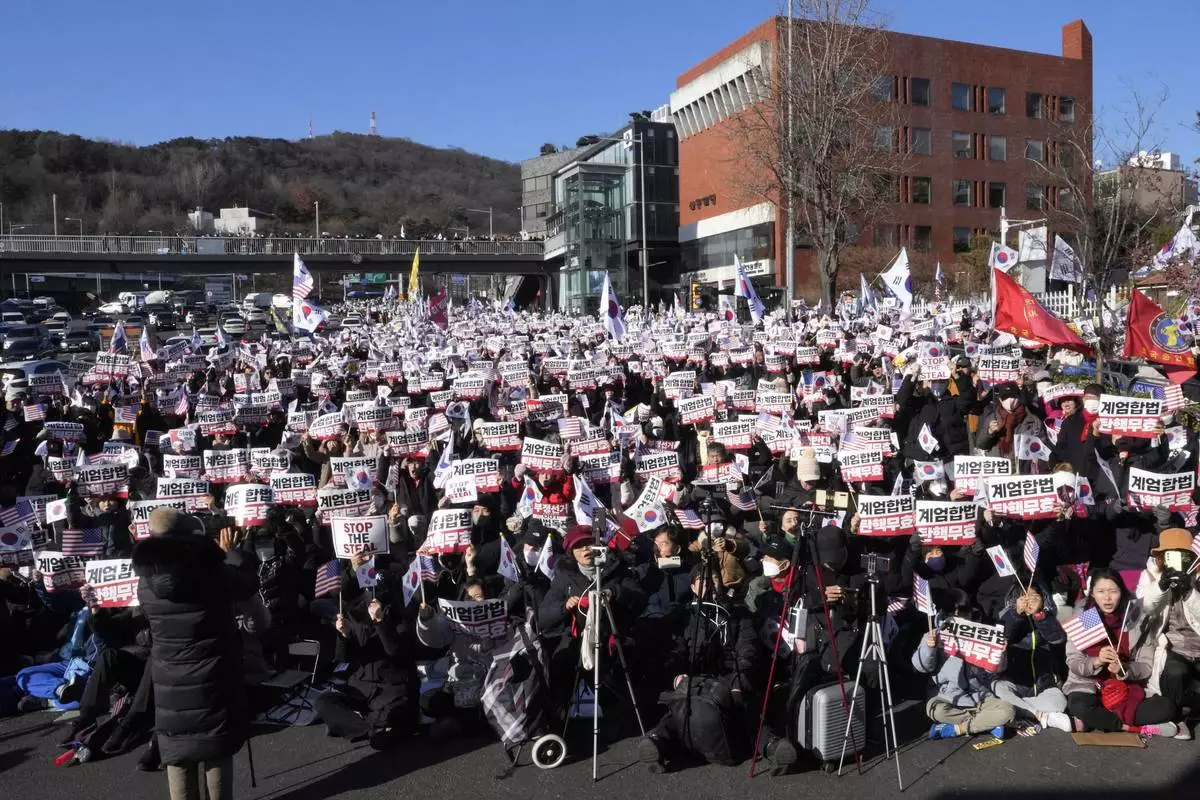
Supporters of impeached South Korean President Yoon Suk Yeol stage a rally to oppose a court having issued a warrant to detain Yoon, near the presidential residence in Seoul, South Korea, Thursday, Jan. 2, 2025. The signs read, "Oppose impeachment." (AP Photo/Ahn Young-joon)
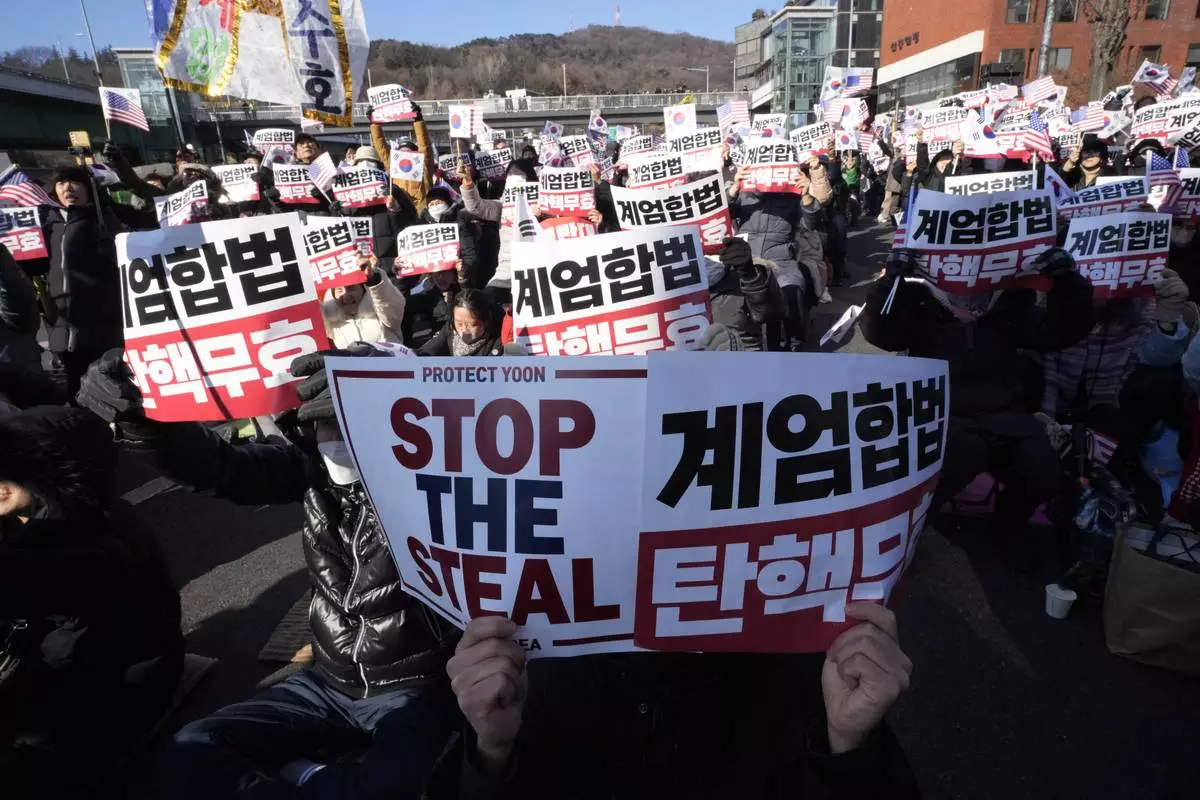
Supporters of impeached South Korean President Yoon Suk Yeol stage a rally to oppose a court having issued a warrant to detain Yoon, near the presidential residence in Seoul, South Korea, Thursday, Jan. 2, 2025. The signs read, "Oppose impeachment." (AP Photo/Ahn Young-joon)
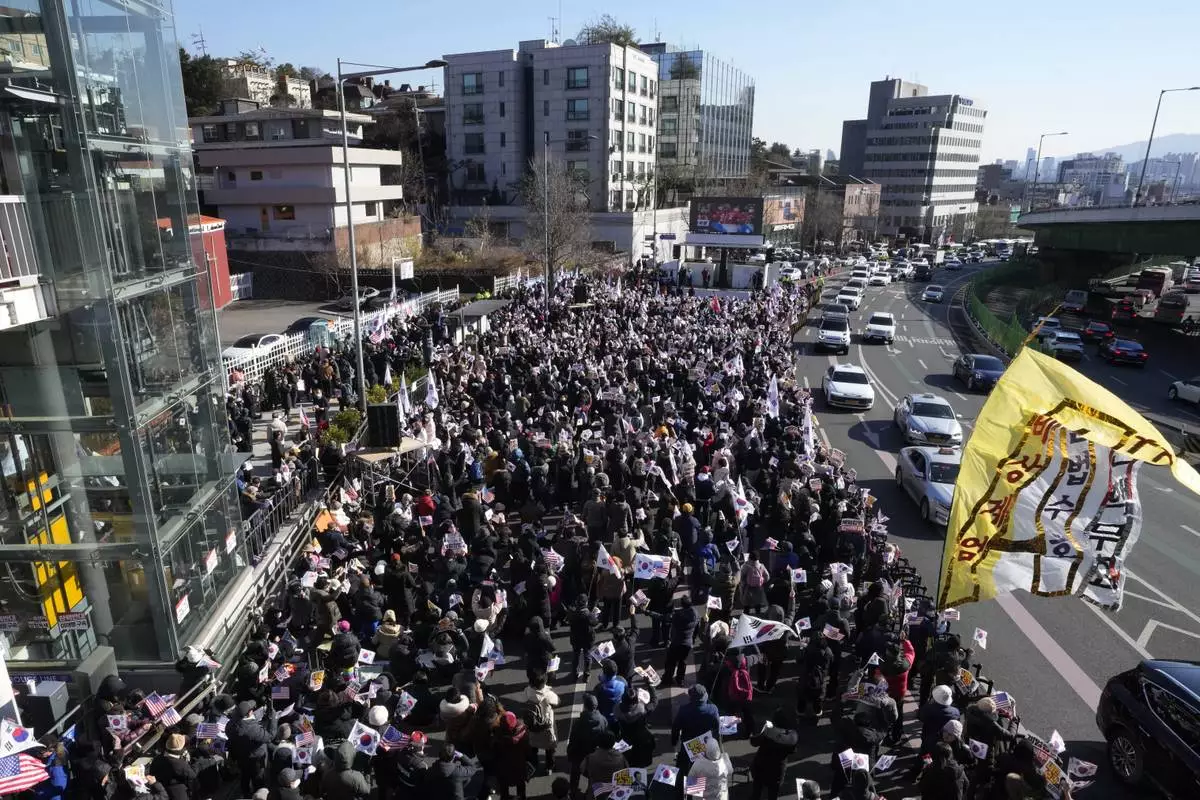
Supporters of impeached South Korean President Yoon Suk Yeol stage a rally to oppose a court having issued a warrant to detain Yoon, near the presidential residence in Seoul, South Korea, Thursday, Jan. 2, 2025. (AP Photo/Ahn Young-joon)
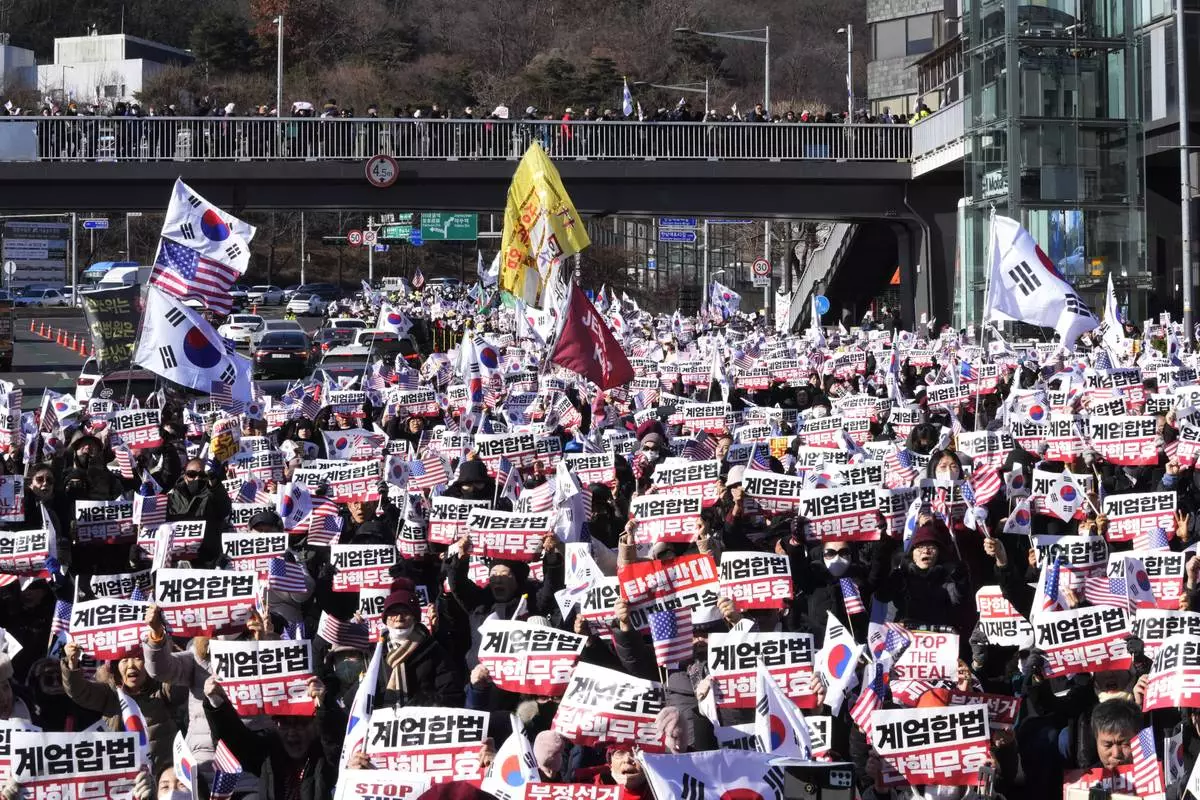
Supporters of impeached South Korean President Yoon Suk Yeol stage a rally to oppose a court having issued a warrant to detain Yoon, near the presidential residence in Seoul, South Korea, Thursday, Jan. 2, 2025. The signs read, "Oppose impeachment." (AP Photo/Ahn Young-joon)
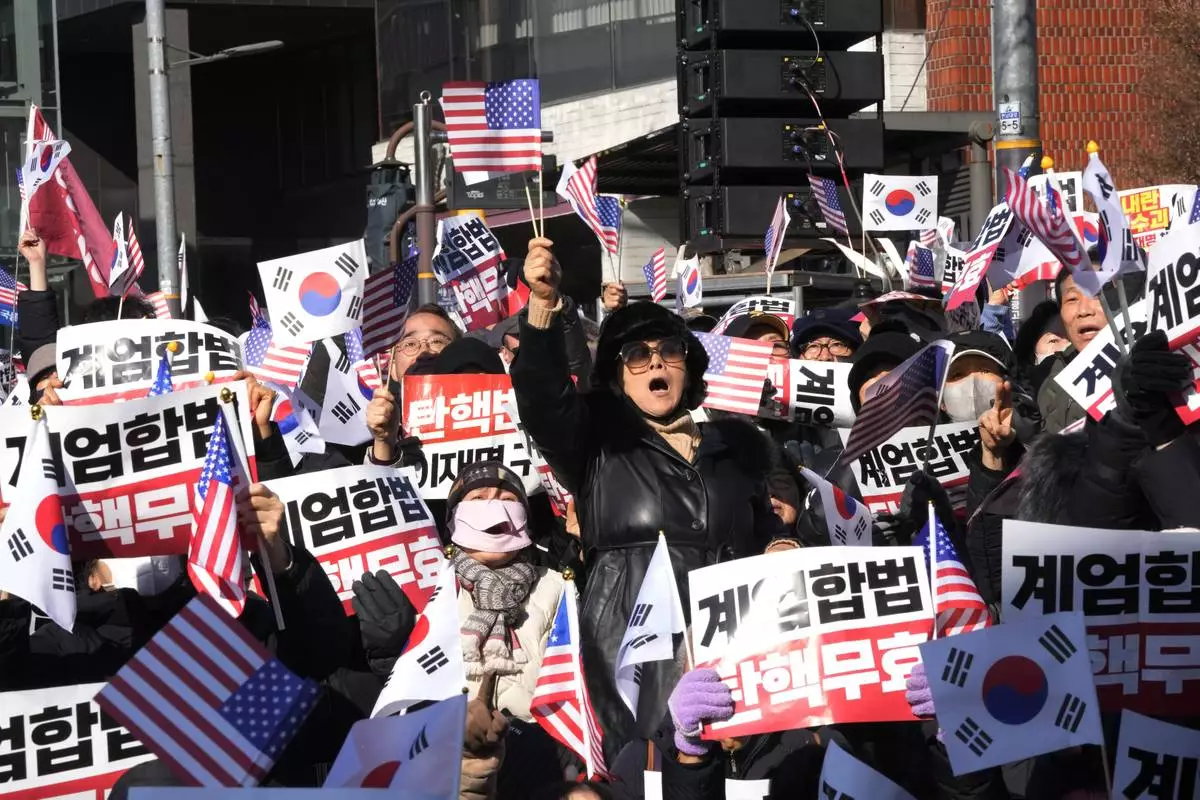
Supporters of impeached South Korean President Yoon Suk Yeol stage a rally to oppose a court having issued a warrant to detain Yoon, near the presidential residence in Seoul, South Korea, Thursday, Jan. 2, 2025. The signs read, "Oppose impeachment." (AP Photo/Ahn Young-joon)
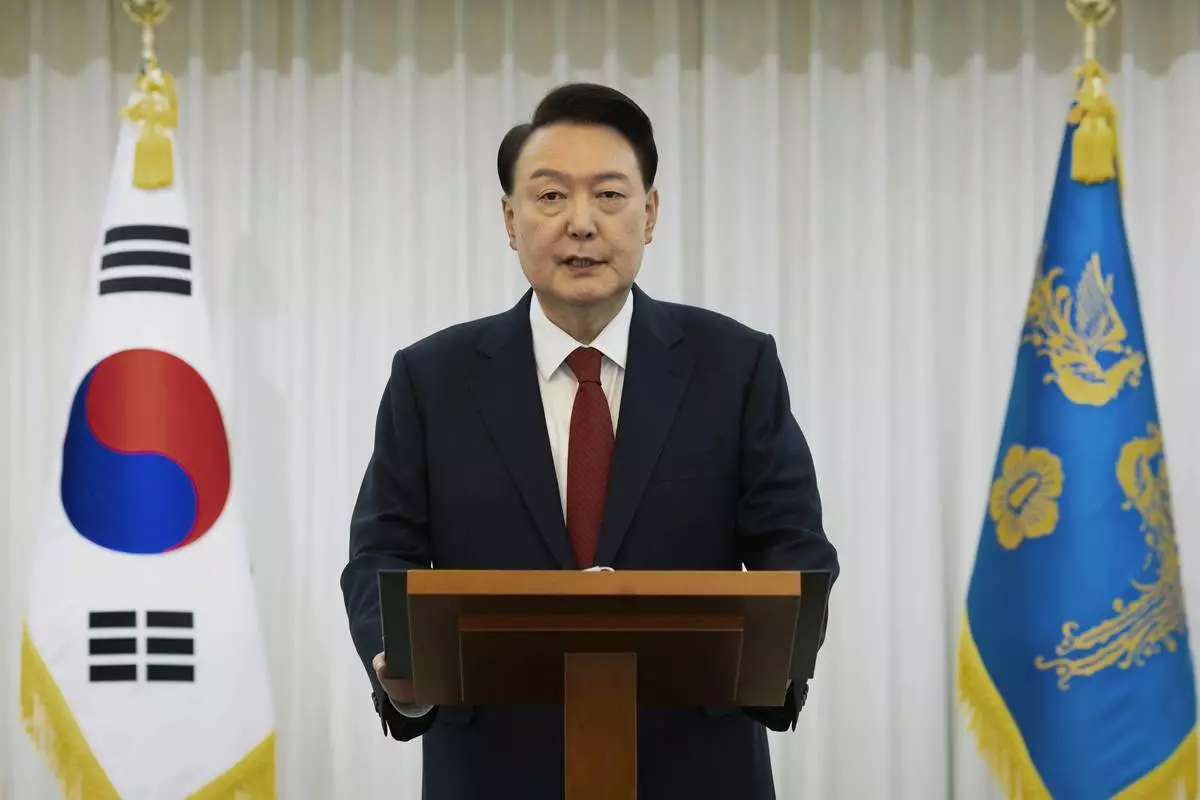
FILE - In this photo provided by the South Korean President Office, the country's President Yoon Suk Yeol speaks at the presidential residence in Seoul, South Korea, Dec. 14, 2024. (South Korean Presidential Office via AP, File)



